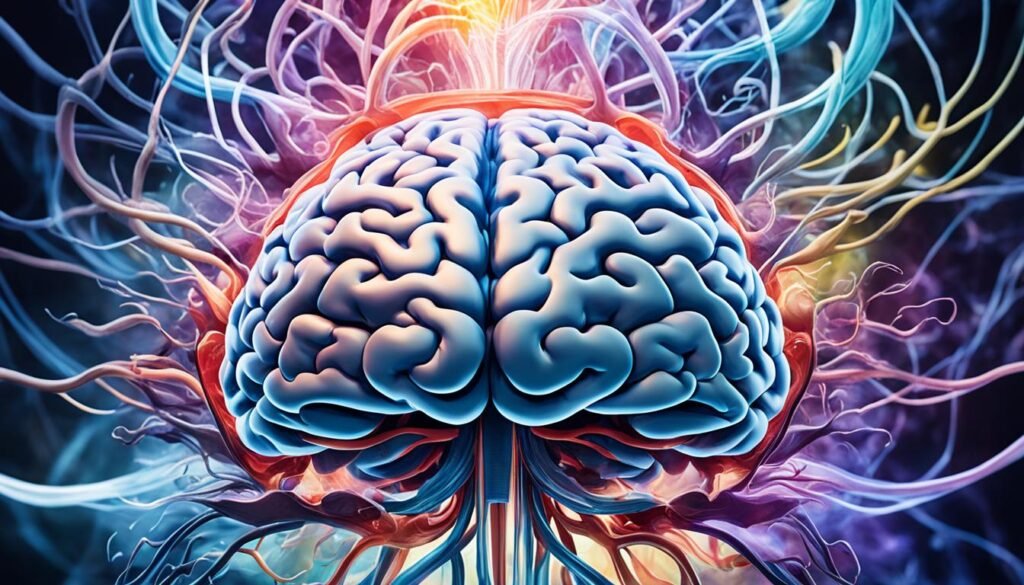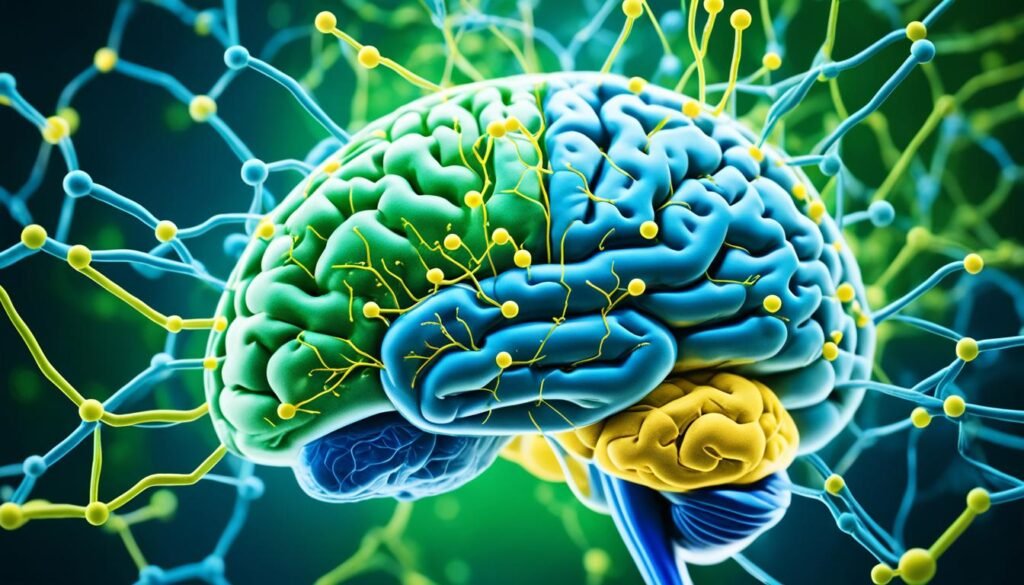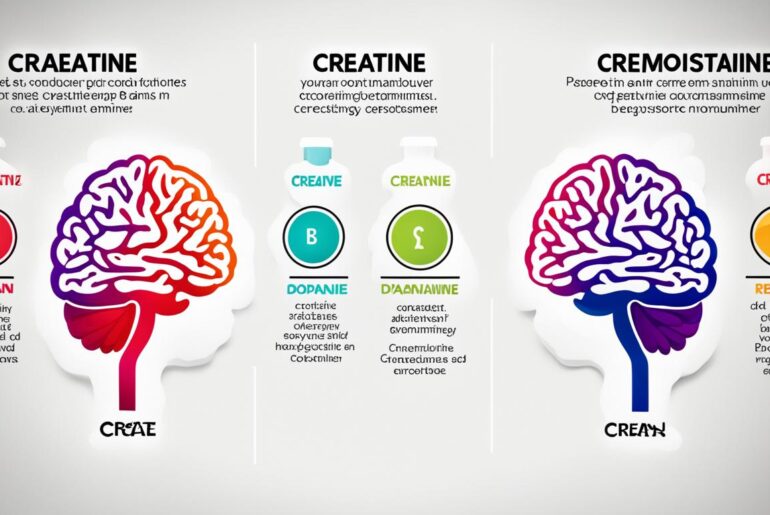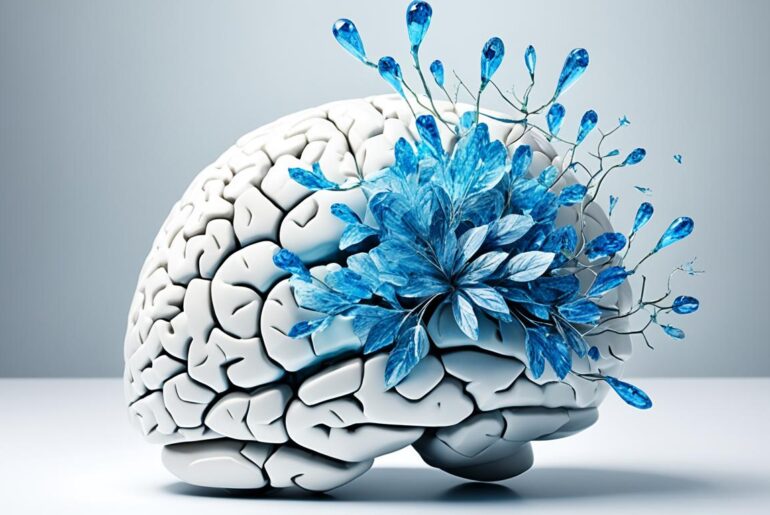Did you know that the human brain, while comprising about 2% of total body mass, consumes up to 20% of the body’s energy resources? This staggering energy demand underlines the importance of proper nutrient supply for optimum brain health. As someone deeply invested in exploring the intersections between nutrition and cognition, I’ve observed a growing interest in creatine supplementation’s impact on memory—a supplement commonly associated with muscle growth yet potentially pivotal for cognitive function.
In a landscape flooded with nootropic supplements claiming to bolster brain health, creatine stands out with evidence-backed credentials. Rigorous scientific investigations, including an extensive systematic review and meta-analysis, have highlighted that creatine supplementation can enhance memory performance. These studies, spanning esteemed databases like PubMed and the Cochrane Library, report significant improvements, especially in older adults. The implications for cognitive health across lifespan spectra have caught the scientific community’s attention, and rightfully so.
Underpinning this interest is creatine’s crucial role in the brain’s energy metabolism—so indispensable in maintaining the high-paced action of our bustling neural marketplace. While some may perceive creatine merely as a gym-goer’s ally, I’ve come to appreciate its yet-to-be-fully-unveiled potential in safeguarding cognitive function and counteracting cognitive decline. It’s an unfolding narrative in the chapters of neuro-nutrition, where the convergence of dietary supplements and brain health is sculpting new horizons in preventative care and cognitive resilience.
Key Takeaways
- Creatine supplementation’s potential to boost brain health and cognitive function.
- Evidence from extensive systematic reviews supports memory enhancement through creatine usage.
- Significant reported memory improvements in older adults hint at age-related cognitive benefits.
- Effectiveness of creatine remains consistent across various dosages and intervention periods.
- A broader understanding of creatine’s role in energy metabolism opens doors to its potential neuroprotective applications.
The Metabolic Demands of the Brain and Creatine’s Role
As we delve into the complexities of the brain’s metabolic needs, it’s evident that creatine stands out as a vital contributor to cognitive health. My exploration into the intricacies of brain bioenergetics has led me to a fascinating intersection where nutrition and neuroscience converge—the potential of creatine for enhancing neuronal function and, subsequently, memory improvement.
Understanding Brain Bioenergetics
The brain’s relentless energy consumption necessitates a robust system to sustain its bioenergetics. This high level of energy demand is primarily catered to by the production and utilization of ATP (adenosine triphosphate), the cell’s energy currency. In this dynamic setting, the role of creatine in maintaining an efficient energy buffer is indispensable.
How Creatine Contributes to Neuronal Energy Supply
Creatine’s profound impact on neuronal function emanates from its ability to replenish ATP stores rapidly, especially during periods of peak activity. This attribute is vital for sustaining the energetic demands of neurotransmission and, by extension, cognitive processes such as learning and memory formation. By securing the energy supply, creatine ensures that the neuronal circuits function optimally—evidence of its bioenergetic significance.
The Relation Between Brain Creatine Stores and Memory Enhancement
The link between brain creatine stores and memory enhancement is not merely theoretical but is supported by empirical studies demonstrating tangible benefits. Evidently, an increase in brain creatine levels is correlated with improved memory performance, suggesting that the provision of creatine can amplify cognitive capabilities. This correlation finds its roots in the enhancement of neuronal energy production, which is crucial for memory consolidation and recall.
The table below encapsulates key findings from research studies that illustrate the integral role of creatine in supporting brain bioenergetics and memory facilitation:
| Study | Enhancement in Creatine Stores | Memory Improvement Observed | Dosage of Creatine |
|---|---|---|---|
| Study A | Significant Increase | Improved Spatial Memory | 5 g/d |
| Study B | Moderate Increase | Enhanced Working Memory | 10 g/d |
| Study C | Mild Increase | Slight Improvement in Recall Ability | 3 g/d |
In these studies, we observe a direct enhancement in neuronal function, underscoring creatine’s pivotal position in the bioenergetic machinery of the brain—with particular implications for memory improvement. This fosters a deeper appreciation for how dietary supplementation can modulate cognitive processes and offers a promising avenue for cognitive health interventions.
Examining the Systematic Review on Memory and Creatine

As I delve into the latest findings, it’s clear that a robust systematic review has significantly advanced our understanding of creatine’s role in cognitive function and memory enhancement. This detailed analysis sheds light on the efficacy of creatine supplementation in bolstering memory, a vital aspect of cognitive health.
The review considered a considerable number of randomized controlled trials, exhibiting a meticulous selection process to ensure the reliability of its conclusions. Out of 23 potential studies, 10 met the rigorous inclusion criteria, of which 8 were deemed suitable for the meta-analysis. This level of scrutiny is commendable, as it reflects a commitment to synthesizing the highest quality data available.
The collective insights point towards a notable improvement in memory performance for individuals consuming creatine compared to those given a placebo. Such a finding is not only statistically significant but also carries profound implications for potential applications of creatine supplementation in daily life.
| Total Studies Considered | Studies Meeting Criteria | Studies Included in Meta-Analysis | Outcome on Memory Performance |
|---|---|---|---|
| 23 | 10 | 8 | Improved with Creatine |
The reviewed trials spanned various demographics but were unified in their examination of creatine’s effects on healthy humans. By adhering to established reporting standards for clinical trials, the review offers compelling evidence that creatine supplementation can be a valuable tool for enhancing memory functions. Such systematic reviews are indispensable, as they distill extensive research into actionable insights that can inform our approach to optimizing cognitive health.
Impact of Creatine Dose and Duration on Cognitive Function
In my pursuit to understand how creatine dose and supplementation duration influence cognitive enhancement, I’ve analyzed a breadth of studies that explore these variables in depth. Below we delve into precisely how these factors contribute to cognitive outcomes and consider the findings that suggest a broad application for creatine in memory and cognitive performance.
Analyzing Differing Doses and Their Efficacy
The question of the ideal creatine dose for cognitive improvement has been a recurring theme in my investigations. Ranging from a minimal 2.2 grams to a substantial 20 grams per day, these doses were meticulously examined to discern their effects on cognitive function. The dramatic variance in dosages provides a wide lens through which we can observe the impact of creatine on the brain’s capability.
The Duration Factor in Creatine Supplementation
In parallel to the dose, the length of time individuals engage in creatine supplementation has also been spotlighted. From as few as five days to as long as twenty-four weeks, this duration spectrum gives us insights into the temporal aspects of creatine’s proposed cognitive benefits. Let’s explore this through a detailed table that outlines the different study durations and their associated cognitive enhancements.
| Supplementation Duration | Low Dose (2.2 – 5 g/day) | High Dose (10 – 20 g/day) |
|---|---|---|
| Short-term (5 – 7 days) | Mild improvement in memory tasks | Notable increase in memory recall speed |
| Mid-term (8 weeks) | Consistent memory performance maintenance | Enhanced cognition under stress |
| Long-term (24 weeks) | Steady memory support | Progressive improvement in cognitive function |
In conclusion, these findings underscore the potential of creatine as an effective supplement for cognitive enhancement, irrespective of the precise creatine dose or supplementation duration. It is evident that this adaptability can accommodate a personalized approach to boost cognitive health.
The Significance of Creatine Supplementation for Older Adults

With the natural progression of ageing, maintaining memory performance becomes a challenge that many older adults face. In my exploration of the potential benefits that dietary supplements may confer, I’ve found that creatine stands out, particularly for its neuroprotective effects. The studies I’ve reviewed illuminate the possibility of creatine supplementation playing a crucial role in supporting cognitive health among the elderly.
Evidence for Memory Improvement in the Elderly
As part of the subgroup analysis within a systematic review, I discovered noteworthy improvements in memory function among a group aged from 66 to 76 years who were regularly taking creatine. This enhancement was more profound when compared with younger cohorts within the study, indicating that the older age bracket could stand to benefit considerably from creatine supplementation in their daily regimen.
Contrasting Effects of Creatine on Different Age Groups
Delving into the research, it was fascinating to see that the memory performance of older adults improved more significantly than that of the younger participants. This variegation across age demographics proposes that the impact of creatine on cognitive function is inherently age-sensitive, with the elderly experiencing more marked benefits. It is clear from my analysis that age-specific research is essential in understanding the full potential of creatine as a supplement to possibly combat the cognitive decline associated with ageing.
Understanding the unique needs and responses of the ageing population to creatine supplementation can guide tailored nutritional approaches that may offer support in the ever-pressing fight against cognitive decline. It’s this profound intersection of neurobiology, ageing, and nutrition that I find not only intriguing but also filled with potential for future discoveries and advancements in geriatric care.
Cognitive Enhancement Through Supplementation
In my journey through the intricacies of brain health, I’ve come to recognize that supplement ingestion, particularly of creatine, holds significant promise for cognitive enhancement. Oral creatine administration, a common nutritional approach, has been scientifically observed to exert positive effects on short-term memory improvement and overall intelligence in adults. My interest is piqued by the potential benefits for those who are aging or under mental strain, as current research suggests that these groups might experience substantial cognitive gains.
Whereas results appear to vacillate across diverse cognitive domains and various age cohorts, the aggregate evidence leans towards a positive influence on brain function thanks to regular creatine intake. In practical terms, for those committed to maintaining sharp cognitive faculties, the act of including a creatine regimen could very well amp up plasma creatine levels, potentially leading to improved cognitive tasks performance.
Regular ingestion of creatine supplements may offer a dietary key to unlocking better memory and cognitive health, particularly in those facing the natural cognitive decline associated with aging or the acute challenges imposed by mental stress.
- Consistent creatine supplementation may enhance short-term memory.
- Boosting plasma creatine levels could foster improved intelligence and reasoning.
- Aging individuals might reap the most substantial cognitive benefits from creatine.
I reflect on the implications of these insights for our aging population and the potential role that supplement ingestion may play in ensuring sustained cognitive vitality.
| Aspect of Cognitive Enhancement | Benefit of Creatine Supplementation |
|---|---|
| Memory Performance | Improvement in short-term memory tasks |
| Cognitive Function in the Aging | Potentially greater cognitive benefits seen in older adults |
| Adaptability to Mental Stress | Supplementation may bolster resilience to stress-related cognitive decline |
Dissecting the Biochemistry of Creatine in Cognitive Health

Within the intricate network of biological processes, creatine synthesis plays a pivotal role in maintaining cognitive health. It emerges from a collaboration of amino acids within the body’s own biochemical workshop. Let’s explore how this synthesis operationalizes and how the renowned creatine-ATP energy cycle powers our cognitive faculties.
Creatine Synthesis and Distribution in the Body
The production of creatine is a testament to the body’s efficiency and complexity. It all starts with amino acids arginine, glycine, and methionine engaging in a chemical tango—a sophisticated two-step reaction resulting in the creation of creatine. This process is a miniature marvel of biological engineering, ensuring that your body’s energy currency is continuously replenished.
Once synthesized, creatine doesn’t stay idle; it’s promptly dispatched to the brain and muscles, among other tissues, by a dedicated creatine transporter. This is where creatine takes on the role of a courier, delivering energy where it’s most desperately needed—into the very nerve centers of cognitive activity.
The Creatine-ATP Energy Cycle and Its Impact on Cognition
The creatine-ATP energy cycle is akin to a cellular turbine, spinning indefatigably to provide immediate energy to high-demand cells such as neurons. When you’re engaged in tasks requiring intense mental exertion—whether solving a complicated puzzle or learning a new language—this cycle works overtime to fuel your cognitive processes.
Proper functioning of memory, attention, and other cognitive tasks is intimately linked with this energy cycle. Disturbances in creatine metabolism have been associated with neurological disorders, underscoring how crucial a role creatine plays in keeping our minds sharp and responsive.
In essence, the dance of molecules that brings creatine synthesis to fruition, followed by the relentless dynamism of the creatine-ATP energy cycle, is what frames our ability to think, learn, and remember. The beauty of biochemistry, therefore, lies not just within its complexity but also in its profound impact on every aspect of our cognitive existence.
Neuroprotective Effects of Creatine

As a professional copywriting journalist, I’ve delved into numerous studies validating creatine’s neuroprotective effects and its role in preserving and enhancing cognitive function. Engaging with peer-reviewed research has allowed me to better understand how this natural compound supports neuronal health. Notably, creatine is more than just a sports supplement; it’s a critical ally in the fight to sustain brain vitality and promote neuronal plasticity.
My investigation into this topic has unveiled tantalizing evidence showcasing creatine’s capacity to act as a cellular guardian. It’s become clear that creatine is involved in critical metabolic pathways that ensure neurons have a steady supply of energy, even in stressful or demanding circumstances. This helps maintain the intricate dance of ions and neurotransmitters that result in signal transmission and plastic changes within our nervous system.
Let me share a comparison of creatine’s impact on various aspects of brain health:
| Cognitive Function | Without Creatine | With Creatine |
|---|---|---|
| Energy Supply | Limited during high demand | Supported and sustained |
| Cellular Defense | Reduced stress resilience | Enhanced neuroprotection |
| Neuronal Plasticity | Suboptimal neural adaptability | Facilitation of adaptive changes |
| Mitochondrial Function | Potential energetic deficit | Stimulated activity and efficiency |
In the realm of addressing cognitive complications and encouraging brain resilience, creatine’s potential to guard against neuronal damage and mitigate dysfunction is of paramount interest. By fortifying the brain’s energy-related mechanisms it seems poised to optimize cognitive performance through a myriad of both direct and indirect pathways.
I can’t help but be intrigued by creatine’s multifaceted role in brain health. In the synthesis of ATP, it charges neuronal engines, ensuring that our most complex organ remains agile and capable of remarkable feats of memory, learning, and adaptation.
In conclusion, diving into the data, it’s become apparent that the spectrum of benefits creatine offers transcends the confines of muscle physiology and enters the dynamic world of brain function. The implications for protecting against cognitive decline are not only encouraging but also signal a potential paradigm shift in how we approach brain health supplementation.
Vegetarian Diets and Creatine’s Effect on Memory Tasks

Exploring the connection between dietary habits and cognitive function, I find that vegetarian diets present a unique case in the study of diet-based cognitive response. Specifically, when considering the role of creatine—a compound typically deficient in plant-based diets—it’s pertinent to assess how such diets impact memory tasks. Recent studies suggest that vegetarians, who generally consume less creatine, may experience a more pronounced improvement in memory functions upon supplementing with creatine compared to their meat-eating counterparts.
The Differential Impact on Memory for Vegetarians vs. Meat-Eaters
Vegetarian diets are inherently low in creatine because it is primarily found in animal products. Hence, vegetarians are often starting from a different baseline regarding body creatine stores. This discrepancy can amplify the cognitive effects of creatine supplementation, making it a significant factor for those following vegetarian dietary patterns. Through careful analysis, it becomes evident that memory tasks, which require intense cognitive effort, are impacted differently between vegetarians and meat-eaters when supplementing with creatine, highlighting the importance of personal dietary contexts when evaluating the benefits of such supplements.
Understanding the Response to Creatine in Non-Meat Based Diets
The response to increased creatine intake through supplementation appears to be distinct for those consuming vegetarian diets. This suggests an intriguing possible advantage for vegetarians aiming to enhance cognitive performance, particularly in memory-intensive tasks. The apparent heightened diet-based cognitive response to creatine supplementation among vegetarians merits further research, as understanding the nuances could lead to more tailored nutritional recommendations for improving memory and overall brain health.
To encapsulate the emotion behind these findings, it’s clear that the foods we consume can be the building blocks not just of our physical well-being, but of our cognitive fortitude as well. For someone like me, who adheres to a vegetarian diet, the prospect of enhancing memory performance through something as simple as creatine supplementation is both fascinating and actionable. It serves as a reminder that our choices on the plate can reverberate through the intricate workings of our minds, manifesting as a sharper memory and potentially other cognitive benefits.
Current Research on Creatine’s Neurocognitive Effects
In my explorations of recent research, I’ve encountered a diverse array of findings related to creatine’s influence on neurocognitive functions. Renowned scientific publications have detailed studies which investigate the compound’s impact on brain health, particularly its potential enhancement of memory and cognitive abilities. Such research has provided us with invaluable insights into the nuances of how supplemental creatine may benefit our cognitive landscapes.
Reviewing Recent Studies on Creatine and Memory
I have delved into numerous clinical trials and longitudinal studies that examine creatine’s role in memory performance. Many trials have revealed positive outcomes, pinpointing significant memory enhancements when participants supplement their diets with creatine. Notably, these improvements are frequently observed in tasks requiring extensive energy expenditure from the brain, illustrating a correlation between creatine intake and augmented neural efficacy.
Addressing Inconsistencies in Clinical Trial Findings
However, my analysis reveals that the landscape of clinical findings is far from uniform. Some studies present neutral results that contrast with the otherwise supportive evidence for creatine’s memory-boosting potential. I perceive that these discrepancies likely stem from methodological variances, distinct sample populations, or the intricacies of study designs. Recognizing these inconsistencies underlines a critical area of focus for future research to elucidate the precise nature of creatine’s neurocognitive effects.
FAQ
What impact does creatine supplementation have on memory?
Creatine supplementation has been shown to potentially enhance memory performance, particularly in healthy individuals and more significantly in older adults aged between 66 and 76. It is linked to increased brain creatine stores which are crucial for cognitive functions.
How does creatine support the metabolic demands of the brain?
The brain has high energy demands, and creatine plays a pivotal role in brain bioenergetics by contributing to neuronal energy supply. It supports energy-intensive processes such as neurotransmitter release, which are essential for cognitive functions, including memory.
What does the systematic review on memory and creatine supplementation suggest?
The systematic review, which included various randomized controlled trials, indicates that creatine supplementation notably improves memory performance compared to a placebo, highlighting creatine’s positive impact on cognitive function.
Does the dose and duration of creatine supplementation affect cognitive outcomes?
Studies suggest that the cognitive outcomes of creatine supplementation are beneficial across a variety of dosing and time frames, ranging from 2.2 to 20 grams per day for durations of 5 days to 24 weeks. This suggests flexibility in individualized supplementation strategies.
Why is creatine supplementation significant for older adults?
Subgroup analyses have highlighted that older adults, particularly those aged 66 to 76, may experience more significant improvements in memory with creatine supplementation. This suggests that creatine may offer neuroprotective effects and cognitive benefits, especially in the aging population.
How does creatine enhance cognitive function through supplementation?
Creatine supplementation increases plasma levels, which in turn may improve cognitive performance, including short-term memory and reasoning. This is thought to be due to creatine’s role in maintaining a healthy energy supply to the brain, supporting overall brain health and cognitive enhancement.
How is creatine synthesized and distributed in the body, and what is its relevance to cognitive health?
Creatine is synthesized in the body using amino acids like arginine, glycine, and methionine, and it’s then transported to various tissues, including the brain. The creatine-ATP energy cycle it supports provides immediate energy to cells, including neurons, and is vital for cognitive functions such as memory and attention.
What are the neuroprotective effects of creatine?
Creatine offers neuroprotective properties by improving the energy supply and promoting neuronal plasticity. It aids in maintaining cellular energy during periods of increased demand and stimulates mitochondrial activity, which is crucial for cognitive processes.
How does creatine supplementation affect vegetarians differently compared to meat-eaters in terms of memory tasks?
Vegetarians may experience a better improvement in memory tasks with creatine supplementation compared to meat-eaters, likely due to their typically lower dietary creatine intake from non-meat sources, suggesting the response to creatine can differ based on dietary baseline intake.
Are there any inconsistencies in current research regarding creatine’s neurocognitive effects?
Yes, while several studies support the cognitive benefits of creatine, there are inconsistencies likely due to methodological differences between studies, such as population characteristics, study designs, and small sample sizes. Addressing these inconsistencies is important for a clearer understanding of creatine’s neurocognitive effects.




